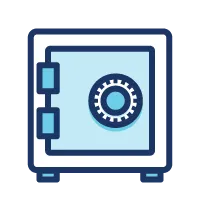What We'll Cover
- How to view your credit score
- How your credit score is determined
- 5 tips on how to establish credit
- How long it takes to establish credit
Whether you like it or not, building credit is essential to living a financially independent life. If you plan to buy a car or a house at any point in the future, chances are you’re going to need a loan, which means a lender will want to make sure you have a history of reliable borrowing.
But what if you don’t have any credit built up or your credit history has been damaged and needs some repair?
The good news is when you're trying to figure out how to establish credit fast, there are strategies that you can use to jumpstart your credit journey.
Why is Your Credit Score Important?
Credit is essential to helping you achieve financial milestones throughout your life. Having good credit can make it easier to rent an apartment, take out a car loan, or buy a home. Even landlords and employers may look at your credit history to get a sense of how financially responsible you are.
Your credit report is a document created by a credit bureau that gives a summary of your credit history. This report shows how much money you’ve borrowed and when, the type of credit accounts you have, if you’ve made payments on time, and more.
Even if you’ve been able to save and manage your money well, it’s your credit report that lenders look at when determining whether you qualify for a credit card or loan. That’s because this report shows how well you manage and pay back borrowed money, which is what you’d be going to a lender for. This is why it’s so important to establish and build credit.
How Does a Credit Score Work?
Before you learn how to establish credit, you should understand exactly how a credit score works and what it means to have a good credit score.
Your credit score is broken down into five different categories, with each category having a different amount of influence on your overall score.
How is Your Credit Score Calculated?![]()
Payment History (35%)
Your history of borrowing money and paying it back on time is the best way for lenders to decide how much they trust you.
Amounts Owed (30%)
Lenders want to see how much debt someone has compared to the amount they have available to borrow.
Length of Credit History (15%)
A longer credit history gives lenders a better idea of a borrower's behavior with borrowing money.
Credit Mix (10%)
If a lender can see the borrower is able to manage a mortgage, a student loan, and a credit card, then this makes the borrower less of a risk to the potential lender.
New Credit (10%)
New credit can both increase and decrease the overall score.
Source: Experian.com

Payment History (35%)
Paying your bills on time affects your credit score more than anything else. A lender’s greatest concern is whether you will make the payments each month and if you’ll make them on time.
Pro Tip: A lengthy history of on-time payments will strengthen your credit score, and missed payments will hurt your credit score. One missed payment will stay on your credit report for seven years!

Amounts Owed (30%)
Right behind your payment history is the amount of debt you currently owe compared to the credit limit you have available. This is known as credit utilization and is expressed as a percentage of the amount you owe versus the amount you have available to spend.
It’s best to keep your credit utilization at or below 30%. That means that if you have a credit card with a credit limit of $1,000, you should try not to spend more than $300 on that card before paying it off. This is also a great time for a friendly reminder to NEVER max out your credit card.
Pro Tip: Credit utilization only factors in revolving credit and does not include installment loans. Revolving credit includes credit cards, personal lines of credit and home equity lines of credit.

Length of Credit History (15%)
A smaller portion of your credit score is based on your credit history. The longer you have an account in good standing, the stronger your credit score.

Credit Mix (10%)
An even smaller portion of your credit score is the mix of credit you’re currently using. Try to diversify your borrowing. Experienced borrowers may have a mix like a credit card, a home equity loan, and an auto loan.

New Credit (10%)
Every time you apply for a credit card, personal loan, or any type of loan for that matter, a “hard inquiry” will be made on your credit. This lowers your credit score initially. However, adding a different type of credit could also increase your score since you’re diversifying your credit and improving your credit mix.
How to Establish Credit: 5 Tips for Starting Out
- Become an Authorized User
- Take Out a Personal Loan
- Build Credit with a Credit Card
- Build Credit with a Secured Credit Card
- Build Credit Without a Credit Card or Loan
Become an Authorized User
One financial hack many people use to establish credit is to become an authorized user on someone else’s account.
The key to having success with this strategy is to only become an authorized user with someone who is and has been extremely responsible with credit cards.
How Does an Authorized User Work?
When the authorized user is added to the primary account, the authorized user will benefit from the primary account holder’s longer record of on-time payments and lower credit utilization.
For example, you may currently have a $1,000 credit limit with a $300 balance, thus having a credit utilization of 30%.
However, when you become an authorized user on another account with a credit limit of $30,000 and a balance of $1,000, your overall credit utilization decreases to about 4%.
Best Practices for Being an Authorized User
When becoming an authorized user, one of the better practices is to have your name added onto the primary account but then never actually taking ownership of the additional credit card.
This protects the primary account holder if you were to overspend using the credit card while still giving you the same benefits of helping you build credit if you were to have the card in your possession.
Also, make certain that the primary account holder’s financial institution reports authorized users to the three credit reporting bureaus so the activity shows up on your credit report. If they don’t, then you won't benefit at all as an authorized user.
Take Out a Personal Loan
Although your credit mix only represents 10% of your overall credit score, taking out a personal loan may help you diversify the type of credit you are using.
Lenders like to see how you manage both revolving credit (credit cards) and installment loans.
A Secured Personal Loan
A secured loan is a loan that is backed by collateral.
Similar to a secured credit card, a secured personal loan is usually approved since the loan is backed by the collateral that the borrower is providing. Also, since the loan is secured and the borrower assumes more risk (the potential loss of collateral), interest rates for secured loans are lower than unsecured loans.
With easy-approval and a lower interest rate, a secured personal loan is a great way to quickly build credit from creating a track record of on-time payments while also diversifying your credit mix.
OneAZ Credit Union offers a Share Certificate Secured Loan where borrowers can get instant approval for a personal installment loan ranging from 12 to 60 months.
An Unsecured Personal Loan
Another option when it comes to opening a personal loan is an unsecured loan.
This type of loan does not require collateral to open the account, therefore transferring more of the risk away from the borrower and onto the lender. Because of that, the interest rate on an unsecured loan may be higher than a secured loan.
OneAZ Credit Union offers a Signature Loan with flexible loan terms and a maximum $2,500 loan credit.
Build Credit with a Credit Card
You can also apply for a traditional credit card and then use the card as a tool to help you establish credit.
Remember, 65% of your credit score is based on how well you make your payments on time and how big of a balance you carry on your card throughout the month.
Always keep these two things in mind when using your credit card to build credit.
By making on-time payments and keeping your balance low, your credit score will improve.
Just as on-time payments and low balance will help you build credit, falling behind on payments and maxing out your card will lower your credit. Even one missed payment will stay on your credit report for seven years! And there’s the interest you’ll have to pay if you miss payments or don’t pay off your bills on time.
What is the Best Credit Card for Building My Credit?
When it comes to choosing a credit card, there are a ton of options.
It seems that every store you walk into has a promotion if you sign up for a store credit card. Every gas station offers a few cents off per gallon if you get their credit card, and, of course, there are countless other options out there for rewards credit cards.
However, if you’re just starting out and looking for the best credit card for building your credit, then definitely go with a straightforward spending credit card through a local bank or credit union.
OneAZ Credit Union has four different credit cards to choose from, with the Visa® Platinum Credit Card being the perfect choice to get started with. This card will help you achieve your main goal of building your credit.
While rewards credit cards can be great, the goal when you’re starting out is to simply build your credit.
The Visa® Platinum Credit Card will help you to do just that.
Build Credit with a Secured Credit Card
If you’re just starting out and you don’t have any credit history, a secured credit card is also a great option.
A secured credit card is similar to a traditional credit card, except a secured card requires an upfront deposit.
This deposit typically starts off at $200 and once the deposit is made, the card can be used just like a normal credit card. However, if the card is not paid on time, the lender of the secured credit card can use the $200 deposit as collateral for the missed payment.
The good news is, just like a traditional credit card, secured credit cards report to the three credit reporting bureaus (Experian, Equifax and TransUnion), thus affecting your credit score.
Pro Tip: You can get one free copy of your credit report each year from all three credit reporting bureaus at annualcreditreport.com.
Best Practices for Using a Credit Card
The key to successfully using a credit card to improve your credit is to only use the credit card as a tool to build credit. Don’t worry about chasing bonus points or cash back just yet. Right now, it’s all about building a strong credit foundation for your financial future.
This means having a plan and a budget in place before you start using the credit card for purchases.
Once you have a budget in place, keep the following in mind when using your credit card:
- No annual fee - There are many options for credit cards without annual fees.
- Stay on budget - Only spend what you can actually pay back each month. Treat your credit card as if it were a debit card where cash actually leaves your checking account every time you use it.
- Pay off your balance in full each month - You can also set up automatic payments to pay your balance in full each month.
- Low Credit Utilization - Keep your credit utilization below 30% at all times. This means if your credit limit is $1,000, keep your balance at $300 or below.
- Avoid using cash advances - Never use the cash advance feature where you can use your card at an ATM.
- Request a credit limit increase - You can do this after you’ve had your new account open and in good standing for six months. A credit limit increase may cause an initial dip in your credit since it requires a “hard pull” on your credit, but you will also benefit from a lower credit utilization.
- Don’t close out old accounts - Closing out older accounts will decrease the length of your credit history thus having a negative impact on your credit score. An open card without any activity will not hurt your credit score. This is also why it’s a better plan to find a card that does not have an annual fee.
- Check your accounts frequently - The best way to avoid missed payments or over-utilization is to check your credit card account frequently. This also allows you to find and report any potentially fraudulent charges right away.
Building Credit Without a Credit Card or Loan
Beyond using credit cards and personal loans to build credit, you may be able to build your credit using phone and utility payments.
It’s important to keep in mind this strategy only works if your utility and phone bill payments are reported to the three credit bureaus so the activity shows up on your credit report. If these payments are not automatically reported, there are companies that will provide your utility and phone payments on your behalf to the three credit bureaus so you can still begin to build credit.
It is important to mention this strategy will not have a substantial impact on your credit and it’s still better to utilize secured credit cards, credit cards, and personal loans as a better option.
Building Credit Frequently Asked Questions
How long does building good credit take?
Establishing credit when you’re just starting out takes at least six months. This is how long it takes to generate a credit score, but it can take longer to earn a good credit score. By following the practices mentioned earlier – like paying your bills on time and using your credit card carefully – you can achieve a better credit score sooner.
What is my credit score if I just turned 18?
You start your credit history with a blank slate. If you just turned 18 and don’t have credit yet, then you simply do not have a credit score. You need at least one or two revolving credit accounts that have been active for at least three to six months to generate a credit score.
How can I check my credit score?
You can request a free copy of your credit report from each of the three major credit reporting agencies – Equifax, Experian, and TransUnion – once per year at AnnualCreditReport.com. It’s a good idea to review these annually so you can report errors or catch signs of identity theft.
Key Takeaways
- Establishing credit is important to help you get a loan, a credit card or even an apartment.
- Your credit score is broken down into five categories, with each category having a different amount of influence on your overall score.
- Start off with a simple credit card or a secured personal loan for quick approval and start building a history of on-time payments to establish good credit.
- It can take at least six months to generate a VantageScore 4.0 credit score.
When you’re just starting out and wondering how to establish credit, remember that the best strategy is to think of your credit options as tools that are only there to help you build credit – nothing else.
Start off with a simple and straightforward credit card or a secured personal loan for quick approval and start building a history of on-time payments.
Chris “Peach” Petrie is the founder of Money Peach. Money Peach partnered with OneAZ to provide free financial education to members across the state. To learn more about OneAZ’s partnership with Money Peach, click here.
APR = Annual Percentage Rate













